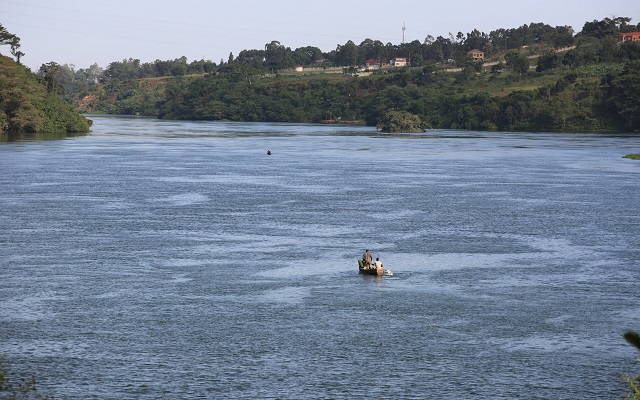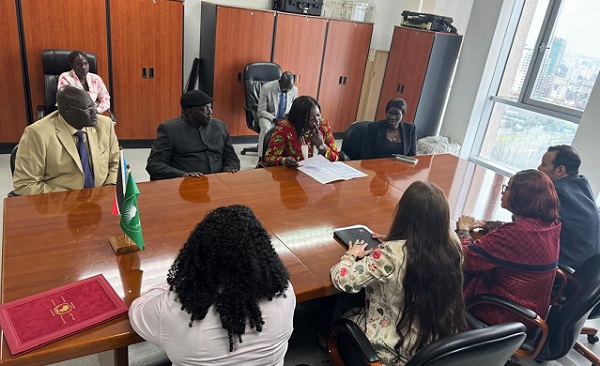
ANALYSIS | RONALD MUSOKE | Following South Sudan’s recent accession to the Nile Cooperative Framework Agreement and subsequent depositing of the instrument of ratification at the African Union’s Legal Council offices in Addis Ababa, the River Nile Basin will finally get a fully-fledged Commission this October.
The new Commission will replace the Nile Basin Initiative (NBI), an institution that has been running the affairs of the 10 riparian countries of the Nile Basin since 1999.
Dr. Florence Grace Adongo (PhD), the Executive Director of the NBI, told The Independent on Aug.22 that the announcement for the establishment of the commission will officially be made during the second Nile Basin heads-of-state summit scheduled for October 17 in Kampala.
She said the summit is building on the momentum “arising from South Sudan’s recent accession of the Cooperative Framework Agreement (CFA)” on July 8, and her depositing of the instrument of ratification at the AU in Addis Ababa on Aug.14.
The CFA which came into being in 2010 effectively seeks to sidestep the 1902, 1929 and 1959 colonial agreements which were apparently made in favour of both Egypt and Sudan when it came to utilization of the River Nile’s water resources.
The CFA is therefore a legal agreement that provides for how the business of the Nile River Basin will be conducted in the current times by all the member states of the Nile Basin. It talks to the principles that have been adopted by the 10 countries among which include the use in terms of managing and equitably developing the resources so there is benefit for all the citizens.
“It also provides for the institutional arrangement and that is where the establishment of the Nile River Commission with its Secretariat in Entebbe comes in,” Dr. Adongo said, adding that: “It also brings in the issue of dispute resolution among member states.”
Since the CFA’s conclusion 14 years ago, six member states (Burundi, Ethiopia, Rwanda, South Sudan, Tanzania and Uganda) have signed and acceded to the treaty. DR Congo, Egypt, Kenya and Sudan have not.
However, in order for the CFA to go into force, at least six member states must ratify the treaty. Also, within 60 days of the CFA coming into force, member states are required to establish a Commission.
Nile Basin Summit agenda
Dr. Adongo told The Independent on the sidelines of a recent regional coordination group meeting of the Nile Basin Investment Programme in Kampala that the heads-of-state summit is intended to “affirm the critical need to strengthen cooperation on the use, development and protection of the Nile River and its Basin.”
She noted that over the last 25 years, the NBI has been performing its core functions and supporting member countries to realise benefits from Nile cooperation in areas of water resources development, transboundary (water) governance, knowledge generation and management to support countries to undertake planning, decision making and also undertake joint projects.
“From our assessment, some of the countries in the Nile Basin remain underdeveloped and, from the same assessment, we notice that the development of this resource (River Nile) can be used to transform the Nile Basin,” Dr. Adongo told The Independent on Aug.22. “It is very important that we have more investments in the Nile Basin that can change the lives and economies of the Nile Basin countries through the Nile Basin Commission.”
During the upcoming summit, the heads of-state-and-government will be expected “to promote engagement with non-members of the Nile River Basin Commission and launch the Nile River Basin Investment Programme.”
Should the Commission be endorsed by the Nile Basin leaders, it will become a fully-fledged legal entity and inter-governmental organization headed by the Executive Secretary based in Entebbe.
It will also enable the cooperating countries to deliver more in terms of water security, food security, energy security, climate action, environmental conservation and transboundary governance, Dr. Adongo said. Should the summit take place this October, it will be the second time the leaders of the Nile Basin countries agree to meet in Uganda. The very first of such summits was held in Entebbe in 2017.
The Nile Basin comprises 10 countries through which the Nile – the world’s longest river – flows. These include; Burundi, the Democratic Republic of Congo, Egypt, Ethiopia, Kenya, Rwanda, South Sudan, Sudan, Tanzania and Uganda. Eritrea is an observer state of the NBI.
With about 10% of the entire continent’s landmass lying in the Nile Basin and with 25% of the continent’s total population (560 million), the basin has one of the most population dense areas in Africa.
Yet the region also continues to grapple with challenges such as; underdevelopment, inadequate electricity for industrialization, increasing population, environmental degradation as well as vagaries of climate change. As a result, these same countries continue to face the challenge of meeting the ever-increasing demands for water, food and energy amidst all these various challenges.
The Nile basin’s environmental assets such as wetlands, forests, river banks are increasingly getting under pressure from expanding economic activities and lack of effective cross-border mechanisms for protection, restoration and sustainable utilization of these ecosystem.
Why South Sudan ratified CFA
Early this month, during the Nile Council of Ministers meeting in Kampala, Pal Mai Deng, South Sudan’s Minister of Water Resources and Irrigation attempted to offer reasons as to why his country ratified the treaty.
He told the meeting that the Nile Basin region is experiencing the worst form of climate crises with Kenya, Burundi, Ethiopia and South Sudan being “hugely affected by torrential rains, landslides and devastating flooding which call for a joint frontline action to combat and mitigate the risks.”
Minister Deng said his country, South Sudan, is committed to the Nile Basin Initiative’s (NBI) shared vision, and his country will work to support NBI’s endeavours to promote joint investment and basin-wide cooperation.
“This climate existential threat requires cooperation and collaboration among the Nile Basin countries for us to be able to adapt and mitigate the risks,” he said, adding that, “Accelerating basin investment in structural and non-structural measures and knowledge and experience sharing may help mitigate the impact of climate change in the region.”
“In addressing the problem of climate change, our strategy is now geared towards water, energy and food security, water resources development and management, with robust climate resilient water infrastructures,” he said.
At the same meeting in Kampala this month, Sam Cheptoris, Uganda’s Minister of Water and Environment who also doubles as the current chairperson of the Nile Council of Ministers (Nile-COM) noted how the Nile Basin is “set to move forward with the establishment of the Nile River Basin Commission.”
Jessica Alupo, Uganda’s Vice President who was the Chief Guest at the Nile-COM meeting in Kampala said the challenges the Nile Basin is facing require collective action by all the basin states since many of these challenges cut across country boundaries; no one country can therefore address them alone.
Alupo noted that even when the Nile riparian states have differences, they should not lose sight of the need to work together to address common problems. “The cost of inaction can be big as all of us know. Cooperation on the Nile is therefore not an option for the member states but a necessity,” she said.
“As a community of nations sharing a major water course, the Nile, working together to explore viable options for addressing the current and future challenges should continue motivating us to cooperate under the Nile Basin Initiative.”
“While Nile Basin States are sovereign and the decision to ratify the CFA entirely lies with them, I still wish to take this opportunity to request the countries that have not yet ratified the CFA to consider doing so in order to enable us have an all-inclusive legal and institutional framework for cooperation on Nile basin issues.”
However, Eng. Daw al-Bayt Abdul Rahman Mansour, Sudan’s Minister of Irrigation and Water Resources told the meeting in Kampala that although the NBI has made significant strides over the last 25 years towards, building trust and confidence for joint action among member countries, more efforts are needed from the institution to consolidate the ongoing cooperation among the member countries.

Minister Mansour told the meeting that the growing pressures on the basin finite water resources calls for innovative and wise use of the water resources, and NBI institution remains the only regional platform for addressing challenges in optimally managing our trans-boundary water resources.
“Sudan emphasizes that working in a consensus manner has to be put into consideration for the establishment of strong and new organization. This, however, becomes a great challenge to riparian countries, particularly in the area of cooperation in the River Nile water and building of confidence among us.”
Egypt’s misgivings
At the same meeting, Dr. Aref Gharib who represented Hani Seliwam, Egypt’s Minister of Water Resources and irrigation said that although Egypt values the opportunity to reaffirm its sincere commitment to promote collaboration with Nile Basin Countries, as Egypt has consistently been at the forefront of regional cooperation since the 1960s.
However, Dr. Gharib said “the NBI had strayed from its founding cooperative principles, notably highlighted by the Nile-COM’s departure from consensus in drafting the CFA.”
“This has resulted in an imbalanced framework that favours unilateralism and lacks provisions for prior consultation, thereby perpetuating a concerning trend of unilateral actions across the basin,” he said.
“As a result, Egypt made the decision to halt its participation in the NBI’s technical activities in 2010. It is important in this regard to emphasize that the draft CFA ratified only by some of the Nile Basin states, and not all Nile Basin states.” “Therefore, the purported CFA is yet a draft until it is finally approved all the 10 NBI states and hence any subsequent acts based upon it fail to produce legal effects,” he said.
In a blog for the European Journal of International Law, Dr. Mahemud Tekuya (PhD), the author of a book titled: “The Nile in Legal and Political Perspective: Between Change and Continuity,” recently argued that while the CFA represents a significant step towards institutional cooperation across the Nile Basin, its implementation could be “extremely challenging.”
He noted that under customary international law, a treaty does not create either obligations or rights for a third party without its consent. He says given that Egypt and Sudan have continued to reject the CFA, it is devoid of any legal relevance in relation to the two upstream countries.
He said considering the geography of the Nile Basin, where upstream water utilization does not affect other upstream states (except, to a lesser extent the states on the Equatorial Nile sub-basin) implementing the CFA without the involvement of Egypt and Sudan is impractical.
“The purpose of a basin-wide agreement on the Nile Basin is to govern the interests of both upstream and downstream states regarding the use, allocation and management of the Nile watercourse.”
Yet, that appears not to be the only challenge. Dr. Tekuya said assuming the CFA can still be practically implemented, its entry into force creates two parallel basin-wide institutions.
According to Article 30 of the CFA, the NRBC would succeed in all rights, obligations and assets of the Nile Basin Initiative (NBI) as soon as the Agreement enters into force. But, since Egypt and Sudan refuse to sign the CFA, the question arises: “What will happen to the rights and obligations under the NBI of the states that are not parties (and do not plan to be parties) to the CFA?”
“Although the establishment of the NRBC without the downstream members of the NBI could exacerbate the existing disputes over the CFA, the legal ramifications of the situation are clear. Under international law, the ramifications of Article 30 apply only to states that are parties to the CFA and NBI.”
“As for the downstream states that are not parties to the CFA, Article 30 is irrelevant, and another agreement would be necessary between the future members of the NRBC and downstream states to transfer the rights, obligations and assets of the NBI to the NRBC.”
However, Dr. Adongo told The Independent that since 1997, all the ten Nile Basin countries including Egypt participated in the negotiations of the CFA up to the very end in 2009.
“They (member countries) addressed the issue of equitable utilization of the water resources by all the Nile Basin countries. They also negotiated a shared vision to achieve sustainable socio-economic development through equitable utilization and benefit from the common Nile Basin water resources.”
“There are also areas that the member countries agreed to; that with the coming up of (the Nile River Basin) Commission, this will be addressed and it was provided in the CFA’s annex (Article 14b).”
Dr. Adongo told The Independent that the member countries felt that it was time for them to sign the CFA and ratify and once the commission comes into being, the members can continue with the negotiations as implementation of the commission’s work.
“In any case, the commission will be there to support the member countries to ensure that any gaps that were not filled are filled.” She told The Independent that the CFA is very clear on what is supposed to be done and how to address what was not concluded.
However, she said she cannot speak for the countries that are yet to ratify the CFA because they have to make their independent decisions. Still, she noted that what’s happening in the Nile Basin is nothing new.
“Look at other river basin commissions around the world; look at the Mekong River Basin Commission, not all countries have signed the agreement but the Commission is there.”
“Look at the Zambezi Watercourse Commission; Zambia did not sign at the beginning but Zambia is still there and they are participating. Even in Europe, the Danube Commission, 14 countries did not come on the same day to establish the Commission.”
“This is not new. Countries need to have time to consult, consider and take the right decisions. And we have seen them come; we started with one and now we have six, and the door is still open. It’s only that the CFA provides that once six countries have ratified, you can start the commission but it doesn’t close the door for the rest.”
“So, we still believe that we shall realise the ten, it’s just a matter of time. We are going to talk and continue talking; engagement never stops in transboundary management of water resources,” she said.
 The Independent Uganda: You get the Truth we Pay the Price
The Independent Uganda: You get the Truth we Pay the Price




Great piece Bro